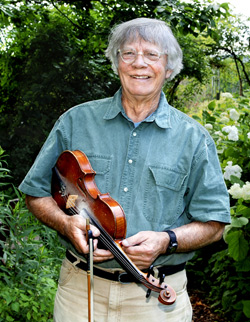Involvement with contra dance
Laufman attended his first dance as a boy while working at the Mistwold Farm in Fremont, New Hampshire in 1948. In 1959, he moved to Canterbury, New Hampshire. He was a founding member of the Canterbury Country Dance Orchestra in 1965. [3]
He began calling and playing for dances, which became known as "Dudley Dances". [4] At times, he was the only remaining callers of contra dances with live music. [1] He worked to spread the tradition, which ultimately caught on and has since spread across the United States and internationally.
Beginning in 1978, Laufman started working with the New Hampshire Artists-in-the-Schools program, teaching contra dances to children. [1]
This page is based on this
Wikipedia article Text is available under the
CC BY-SA 4.0 license; additional terms may apply.
Images, videos and audio are available under their respective licenses.
